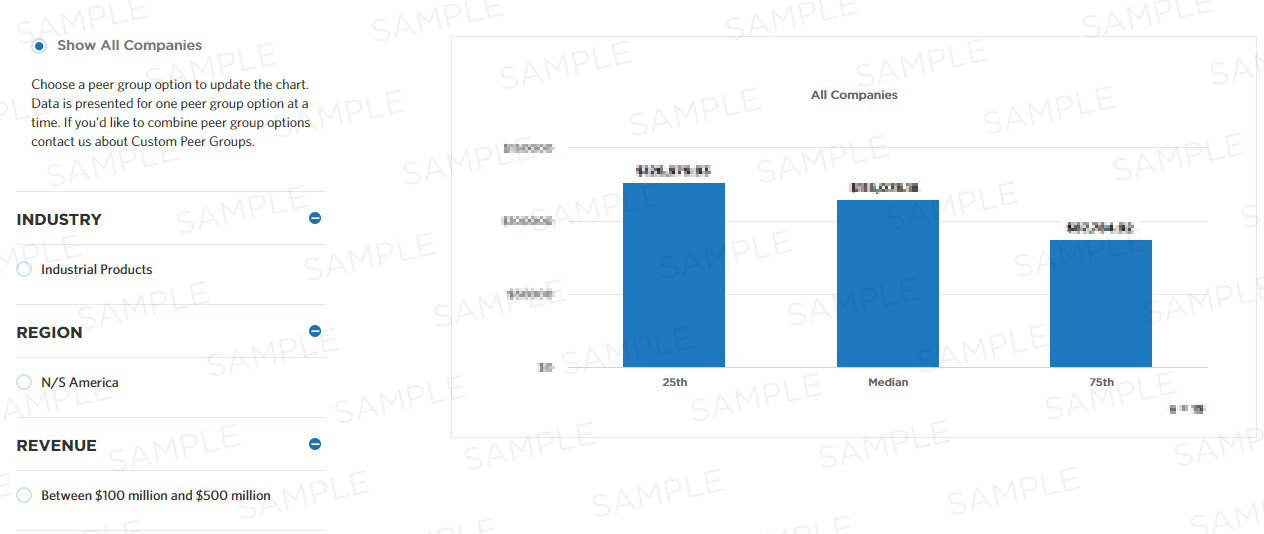Percentage of total cost for knowledge management program, initiative, or service allocated to systems costs for KM applications, platforms, and related technology
This measure calculates percentage of total cost for knowledge management (KM) program, initiative, or service allocated to systems costs for KM applications, platforms, and related technology. KM is responsible for organizing an entity's knowledge base; determining the kind of specialized knowledge an entity possesses, and which elements of this collective knowledge are beneficial; capturing and maintaining this knowledge; and granting access to this library of information. System costs includes salaries, overtime, employee benefits, and bonuses. This measure is part of a set of Supplemental Information measures that help companies evaluate additional variables not covered elsewhere for the "develop and manage enterprise-wide knowledge management (KM) capability" process.
Benchmark Data
| 25th | Median | 75th |
|---|---|---|
| - | - | - |

Compute this Measure
Units for this measure are percent.
(Systems costs for KM program applications, platforms, and related technology / Total cost, excluding overhead cost, for knowledge management program, initiative, or service) * 100
Key Terms
Process Cost Components
Total cost for a process, process group, or function consists of the following five components.
Internal/In-house operating cost consists of the first four components (personnel, systems, overhead, and other).
Personnel Cost
Personnel cost is the cost associated with personnel compensation and fringe benefits of employees (i.e., those classified as FTEs which includes both full-time and salaried/hourly employees) contributing to each respective process. Personnel cost should include all of the following costs.
Employee Compensation: Includes salaries and wages, bonuses, overtime and benefits.
Fringe: Includes contributions made towards the employees' government retirement fund, workers compensation, insurance plans, savings plans, pension funds/retirement plans, and stock purchase plans. This should also include special allowances, such as relocation expenses and car allowances.
Systems Cost
Systems costs include all expenses, paid or incurred, in conjunction with:
Computer hardware or computer software acquired by the organization or provided to the organization through service contracts.
Any related costs to process, service and maintain computer hardware or computer software. The costs of providing and maintaining services for each applicable process (e.g., computer system(s) processing (CPU) time, network/system communication charges, maintenance costs for applications and data storage). This includes the costs related to LANs, WANs, etc. This does not include one-time costs for major new systems developments/replacements. Consultant fees should not be included in depreciation of new system implementations. Include only those costs that occur more than six (6) months after implementation, as normal system maintenance costs. Any systems cost (e.g., maintenance) which is outsourced to a third party supplier should be captured in the separate cost category labeled outsourced cost.
Systems cost should include all salaries, overtime, employee benefits, bonuses or fees paid to full-time, part-time or temporary employees or independent contractors who perform services relating to computer hardware, computer software, processing or systems support.
Overhead Costs
For the purpose of this study, provide the total actual overhead costs for the year related to the specified process. These are costs that cannot be identified as a direct cost of providing a product or a service. Include the primary allocated costs such as occupancy, facilities, utilities, maintenance costs, and other major costs allocated to the consuming departments. Exclude systems costs that are allocated, since these will be captured separately as systems cost.
Other Cost
Other costs are costs associated with the specified process, but not specifically covered in personnel cost, systems cost, overhead cost and outsourced cost in this questionnaire. These other costs include costs for supplies and office equipment, travel, training and seminars. Include the cost of telephones, except for that portion captured in systems cost.
External/Outsourced Cost
In determining outsourced cost, include the total cost of outsourcing all aspects of the specified process to a third-party supplier. Exclude one-time charges for any type of restructuring or reorganization. Outsourced costs should also include costs for intracompany outsourcing (i.e., reliance on a shared services center or other business entity).
Systems Cost
Systems costs include all expenses, paid or incurred, in conjunction with:
Computer hardware or computer software acquired by the organization or provided to the organization through service contracts.
Any related costs to process, service and maintain computer hardware or computer software. The costs of providing and maintaining services for each applicable process (e.g., computer system(s) processing (CPU) time, network/system communication charges, maintenance costs for applications and data storage). This includes the costs related to LANs, WANs, etc. This does not include one-time costs for major new systems developments/replacements. Consultant fees should not be included in depreciation of new system implementations. Include only those costs that occur more than six (6) months after implementation, as normal system maintenance costs. Any systems cost (e.g., maintenance) which is outsourced to a third party supplier should be captured in the separate cost category labeled outsourced cost.
Systems cost should include all salaries, overtime, employee benefits, bonuses or fees paid to full-time, part-time or temporary employees or independent contractors who perform services relating to computer hardware, computer software, processing or systems support.
Supplemental Information
Supplemental information is data that APQC determines is relevant to decision support for a specific process, but does not fit into the other measure categories such as cost effectiveness, cycle time, or staff productivity.